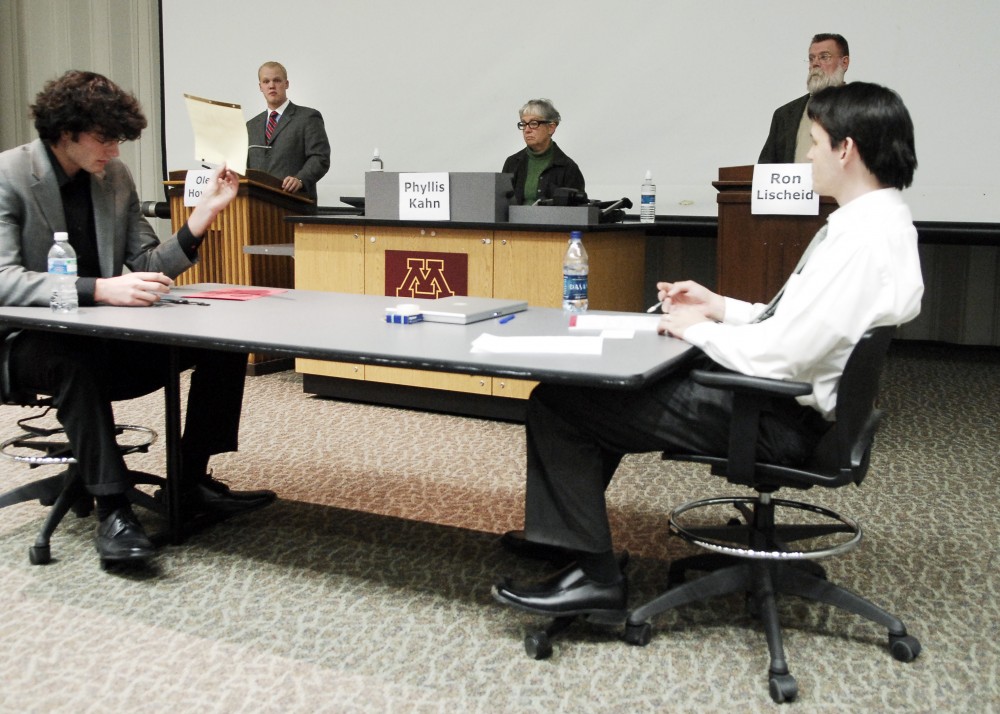In their first and only debate of the election, candidates for Minnesota House District 59B sparred Monday night at Willey Hall. Fielding questions from the moderator and the audience, challengers Ole Hovde and Ron Lischeid fought to gain a foothold against 18-term Rep. Phyllis Kahn Hovde, the Republican candidate and University of Minnesota senior, advocated for fewer taxes and less spending throughout the debate. On tuition, Hovde said he would seek a tuition freeze and seek to work with the Board of Regents to determine University funding priorities. âÄúWhatâÄôs going to cut tuition costs are tuition freezes,âÄù he said. Rep. Kahn, DFL-Minneapolis, touted work-study programs as the best way to cut costs for students, while Independence Party candidate Lischeid advocated for a system in which Minnesotans use their state income tax to pay off their student debt. Kahn and Hovde also disagreed on how to promote small business growth in the state. âÄúOne of the things that I think is most important,âÄù Kahn said, âÄúis the idea of the educated workforce.âÄù Hovde, who runs a window washing business, took offense to the comment, and called for lower taxes on businesses. âÄúPromoting business and job growth is not by new taxes,âÄù he said. âÄúSmall businesses drive Minnesota. Small businesses need to thrive.âÄù The candidates also argued issues ranging from public safety to the Central Corridor light rail line set to go through campus. While Kahn said she was happy with the light rail line, set to run down Washington Avenue, Hovde said he adamantly opposed it. The light rail line would, âÄúdestroy the integrity of the University of Minnesota campus,âÄù Hovde said. Both Kahn and Lischeid said they supported further funding alternative forms of transportation. Before the debate, Kahn and Lischeid passed out campaign literature to the crowd, which could have filled half the lower seating section of the auditorium. Many sported Hovde stickers. After the debate, Hovde said he thought it would have benefited the undecided voters that came to observe. One such voter was first-year student Aaron Seegmiller, who said the debate helped clear up questions he had about the candidates. While he said he plans on voting for Kahn, he said he was impressed by some of HovdeâÄôs answers, as well as Lischeid. Katherine Harris, a mass communication senior, said she plans on voting for Hovde. âÄúItâÄôs really time for someone new,âÄù she said. âÄúI think that Ole being a student is very viable.âÄù Hovde addressed his time at the University multiple times in the debate. âÄúI know what students face,âÄù Hovde said in his close statement. âÄúItâÄôs a year to vote for change; why not start here at the local level?âÄù After the debate, Kahn said her experience in the legislature will make the difference in the election. âÄúI will do a better job for the University and the district than either one of them would do,âÄù she said. Lischeid, who said he has lost his previous 10 election bids, said he represents a change from Kahn, who he contended has been a âÄúball hogâÄù with the districtâÄôs representation. âÄúIf students donâÄôt vote,âÄù he said, âÄúwhatever you get âĦ is stuff that you really canâÄôt blame anyone else for.âÄù All three candidates said they intend to reach out to the University community with a week left before the Nov. 4 election.

Image by Jules Ameel
Moderators signal time left at the debate between State Representative candidates Ole Hovde, Phyllis Kahn, and Ron Lischeid at Willey Hall on Monday evening. The debate was hosted by the Minnesota Republic and will be the only debate between these candidates before the election.
District 59B candidates spar at Willey Hall
Published October 27, 2008
0
More to Discover






